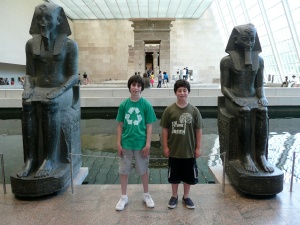 While literal slavery is an abomination against the sanctity of the human spirit, not to mention an ego inflation that strives to elevate certain humans in a place of dominion not just over others but over nature itself (as if we can master life and death by bossing others around), we can also be all sorts of metaphorical slaves: slaves to fashion, slaves to money, slaves to attention, slaves to children… slaves to all manner of fears (of not being loved) and desire (to be loved).
While literal slavery is an abomination against the sanctity of the human spirit, not to mention an ego inflation that strives to elevate certain humans in a place of dominion not just over others but over nature itself (as if we can master life and death by bossing others around), we can also be all sorts of metaphorical slaves: slaves to fashion, slaves to money, slaves to attention, slaves to children… slaves to all manner of fears (of not being loved) and desire (to be loved).
For Jews around the world today marks Passover, a celebration of freedom from slavery—literally, but also, at least potentially, at the mystical, metaphoric and consciousness levels. For Christians, Easter is just around the corner and it may be worth keeping in mind that the Last Supper was a Passover Seder (“Seder” means “order,” since ritual and symbolic foods are eaten in a specific order to remember oppression and maintain gratitude for freedom).
In a nutshell, a rough guide to Passover’s symbols includes: matzoh is flat bread that didn’t have time to rise because the Jews had to get out of Dodge, or Thebes, in a hurry—an old school underground railroad. Foods commemorate bitter experience (horseradish) and tears (saltwater) as well as an evocation of the mortar used in forced labor to build pyramids (nuts, apples, wine and honey). A roasted lamb shank bone commemorates the “passing over” of a curse of death on first born kids that freaked out the Pharaoh into releasing the Jews, who were told to mark their doors with blood and stay inside during the night of terror.
It also strikes me as interesting that the leader of the Seder must wash hands four times during one meal, leading me to suspect that someone back in the Exodus had a little OCD going on.
Passover is really a Jewish Thanksgiving, a holiday about gratitude. So is Easter, in that there is gratitude for sacrifice and redemption—spiritual freedom. I love myths and rituals, but also feel sad that we sometimes seem to have a world of competing myths and a sense of “other” about cultures we do not know well. I grew up learning that you celebrate some things and others you do not. In the family into which I married I learned that you celebrate it all (but mostly leave God outside). In my heart I wish to celebrate it all with everyone, and find that place in which absolutely everything is true—including some sense of awe at the transcendent spirit without having to conclude anything definite about its nature.
So, my vote is to dedicate today to gratitude for the freedoms that we do have—appreciating the ways in which we are free, such as being free to think and say what we want, and free to connect in this strange blogging world; we are also free to realize that we are all interconnected and that all our myths, beliefs, epiphanies and perspectives form a vast and unwieldy consciousness about which none of us have a complete view nor or any final word.
 Out of our freedom, perhaps we can truly wish for health, adequate prosperity, safety, respect and happiness for everyone, no matter what their view or situation, even their view of ourselves; but most of all we might offer up love, trusting that if we truly love, perhaps we too might be understood, appreciated—loved. Wishing the best for each other is enlightened SELF-interest. If we wake up and overcome our fears and our desires, then we are free. Here’s to the liberation of consciousness—in the service of all our collective kids.
Out of our freedom, perhaps we can truly wish for health, adequate prosperity, safety, respect and happiness for everyone, no matter what their view or situation, even their view of ourselves; but most of all we might offer up love, trusting that if we truly love, perhaps we too might be understood, appreciated—loved. Wishing the best for each other is enlightened SELF-interest. If we wake up and overcome our fears and our desires, then we are free. Here’s to the liberation of consciousness—in the service of all our collective kids.
Nama-Stay Free, Bruce


